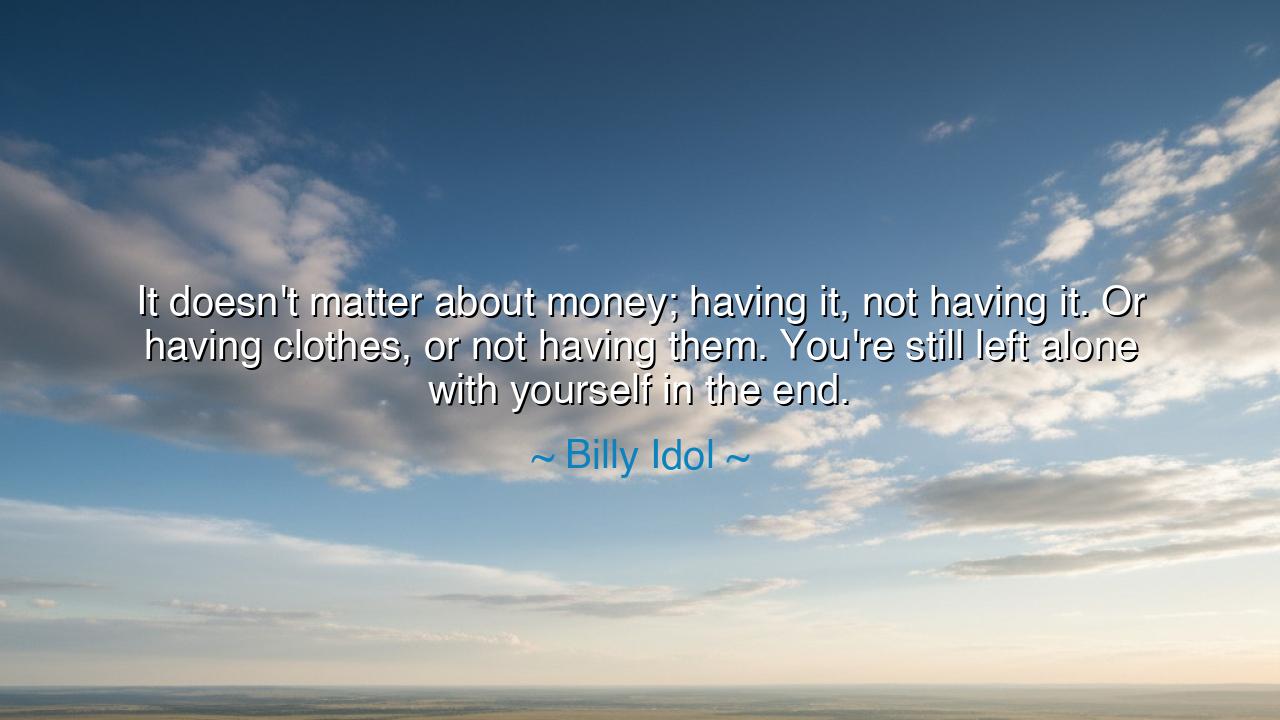
It doesn't matter about money; having it, not having it. Or
It doesn't matter about money; having it, not having it. Or having clothes, or not having them. You're still left alone with yourself in the end.






"It doesn't matter about money; having it, not having it. Or having clothes, or not having them. You're still left alone with yourself in the end." These words, spoken by Billy Idol, strike at the very essence of the human experience. They invite us to reflect on the fleeting nature of material possessions and the ultimate solitude that we must all face, regardless of wealth, status, or circumstance. In the end, no matter what we accumulate in this world—be it money, clothes, or fame—we are all left alone with the most important companion: ourselves. And it is in this solitude that the true nature of our being is revealed.
What Idol emphasizes is that the pursuit of external comforts, while often seen as the path to happiness, does not shield us from the fundamental truth of existence: that we must live with ourselves, day in and day out. The riches we acquire, the clothes we wear, the accolades we receive—these are but fleeting distractions, temporary adornments on the surface of life. When the noise of the world fades away, we are left alone with our thoughts, our fears, our joys, and our regrets. The external world may offer moments of satisfaction, but it is only in the depths of our inner world that we must confront the reality of who we truly are.
Consider the story of Alexander the Great, a man who, in his quest for power and conquest, accumulated vast wealth, territories, and titles. Yet, in the final moments of his life, when faced with the inevitable certainty of death, all of these things became meaningless. In his dying words, he is said to have lamented that he could take none of his riches with him. He realized that wealth, no matter how vast, could not save him from the loneliness of the grave. His inner self, the soul that had driven him to greatness, was what truly mattered. His story is a reminder that no matter how much we accumulate in life, we must ultimately face ourselves alone—unadorned by possessions, titles, or external affirmations.
Idol’s words also point to the universal truth found in the teachings of the ancients: self-knowledge and self-acceptance are the keys to a life of meaning. The Stoics, for example, taught that true contentment comes not from external circumstances but from cultivating virtue and understanding one’s own character. The wise man, they believed, is one who is at peace with himself, regardless of the circumstances he finds himself in. Whether in wealth or poverty, whether in fine clothes or rags, the Stoic remains undisturbed, for he has cultivated the strength to face himself without fear. Self-reliance becomes his greatest treasure.
In more modern times, think of Steve Jobs, a man who revolutionized the technology world and amassed a great fortune. Yet, in the final years of his life, as he battled cancer, he came to realize that it was not his fortune or his successes that mattered most, but the relationships he had nurtured and the legacy he would leave behind. In his last days, he reflected on the importance of inner peace and love, acknowledging that no amount of wealth or external achievement could ever replace the inner contentment that comes from knowing oneself fully. His story serves as a poignant reminder that in the end, we must all confront the truth of our own existence, and it is our inner life that truly defines us.
Thus, the lesson in Idol’s words is clear: material wealth and external status may offer temporary comfort, but they cannot shield us from the solitude that comes with being human. In the end, we must face ourselves without the distractions of riches or possessions. The true challenge of life is not to accumulate more, but to learn to live with the self—to embrace who we are, to come to terms with our own thoughts, feelings, and actions. To love ourselves and accept ourselves without the need for validation from the world is the path to lasting fulfillment.
In practical terms, this means that we should not place our worth in the things we own or the accolades we receive. Instead, we must focus on self-reflection, self-awareness, and personal growth. Take time to understand your true self, beyond the distractions of wealth, status, or appearance. Embrace solitude as an opportunity to connect with your inner self, to find peace within, and to cultivate a life that is authentic and meaningful. For, as Idol reminds us, in the end, it is not the things we have, but the person we are, that we must live with forever.






AAdministratorAdministrator
Welcome, honored guests. Please leave a comment, we will respond soon